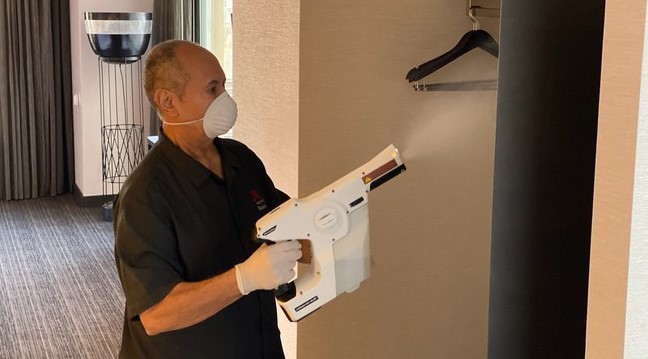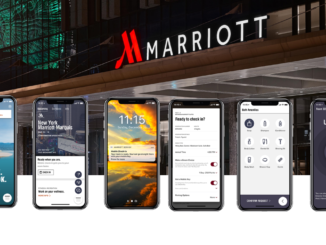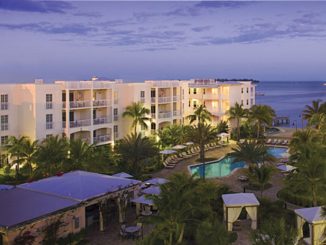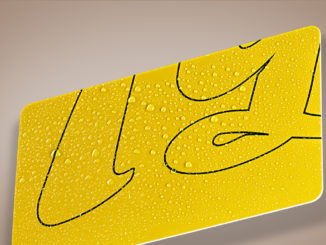
By HTN Staff - 4.22.2020
With COVID-19 front and center, major hotel chains, as well as independents, are working to assure guests that they are safeguarding their health through increased cleanliness, hygiene and social distancing. This week, Marriott International rolled out a multi-pronged platform to elevate its cleanliness standards and hospitality norms and behaviors to meet the new health and safety challenges presented by the current pandemic environment, relying heavily on advanced technologies.
These technologies include electrostatic sprayers with hospital-grade disinfectant to sanitize surfaces throughout the hotel. Electrostatic spraying technology uses the highest classification of disinfectants recommended by the Centers for Disease Control and Prevention (CDC) and World Health Organization (WHO) to treat known pathogens. The sprayers rapidly clean and disinfect entire areas and can be used in a hotel setting to clean and disinfect guest rooms, lobbies, gyms and other public areas.
Marriott, which encompasses a portfolio of more than 7,300 properties under 30 leading brands spanning 134 countries, is also reportedly testing ultraviolet light technology for sanitizing keys for guests and devices shared by associates.
The hotel brand announced that is has created the Marriott Global Cleanliness Council to tackle the realities of the COVID-19 pandemic at the hotel level and further advance the company’s efforts in this area. According to a company press statement, the Council is “focused on developing the next level of global hospitality cleanliness standards, norms and behaviors that are designed to minimize risk and enhance safety for consumers and Marriott associates alike.”
The Council is chaired by Ray Bennett, Chief Global Officer, Global Operations, Marriott International, and will benefit from knowledge and input from both in-house and outside experts including senior leaders from across Marriott disciplines like housekeeping, engineering, food safety, occupational health and associate well-being.
“Marriott has a long tradition of emphasizing cleanliness in our care of guest rooms and in the public spaces of our hotels,” said Bennett. “Through the council and scientific advice of experts, we are taking a thoughtful approach to set an even higher bar of cleanliness and develop new guest interaction protocols. The Marriott Global Cleanliness Council is focused on more than just disinfection across the hotel, we are providing a holistic approach designed to take care of our guests and associates.”
The Council also includes advisory members Dr. Ruth L. Petran, Senior Corporate Scientist, Food Safety & Public Health for Ecolab, a global leader in water, hygiene and infection prevention solutions and services; Dr. Michael A. Sauri, Infectious Disease Specialist at Adventist Healthcare; Dr. Richard Ghiselli, Head of the School of Hospitality & Tourism Management at Purdue University; and Dr. Randy Worobo, Professor of Food Microbiology in the Department of Food Science at Cornell University.
Specific areas of focus include:
- Surface Areas: COVID-19 has raised awareness about the importance of high-touch surface cleanliness. In public spaces, the company has added to its already rigorous cleaning protocols, requiring that surfaces are thoroughly treated with hospital-grade disinfectants and that this cleaning is done with increased frequency. In guest rooms, the company has likewise added to its rigorous protocols, requiring that all surfaces are thoroughly cleaned with hospital-grade disinfectants. Marriott will also be placing disinfecting wipes in each room for guests’ personal use.
- Guest Contact: The CDC and WHO warn about direct, person-to-person contact as the primary way COVID-19 is spread. To help alleviate the risk of transmission this way, the company will be using signage in its lobbies to remind guests to maintain social distancing protocols and removing or re-arranging furniture to allow more space for distancing. Marriott is also evaluating adding partitions at front desks to provide an extra level of precaution for our guests and associates and is working with supply chain partners to make masks and gloves available to associates. The company is installing more hand sanitizing stations at the entrances to its hotels, near the front desk, elevator banks and fitness and meeting spaces. In addition, in over 3,200 of Marriott’s hotels, guests can choose to use their phones to check in, access their rooms, make special requests and order room service that will be specially packaged and delivered right to the door without contact.
- Food Safety: Marriott’s food safety program includes enhanced sanitation guidelines and training videos for all operational associates that includes hygiene and disinfecting practices. At Marriott, all food handlers and supervisors are trained on safe food preparation and service practices. Marriott’s food and beverage operations are required to conduct self-inspection using the company’s food safety standards as guidelines, and compliance is validated by independent audits. In addition, the company is modifying its operational practices for in-room dining and designing new approaches to buffets.
“Safety for our guests and associates has always been a top priority for Marriott and today that discussion of safety is in the context of COVID-19,” said Bennett. “We want our guests to know that we are doing everything we can to welcome them back to a safe and clean hotel environment when they start traveling again.”





